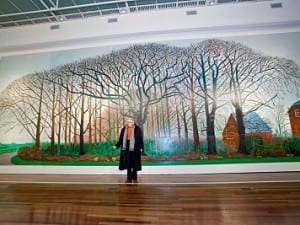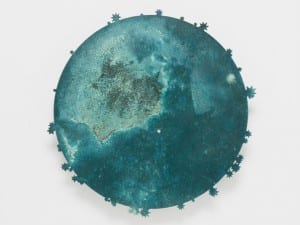In Conversation With
Can you tell me about yourself?
I live in a forest with a deerhound, a lurcher and a husband. Right now we’re surrounded by wild boar and rutting stags. It’s a cliché, but I have a writing shed half way down our hill-like garden. I do love the seclusion of the forest, but I miss the city. I went to London University, and then lived in New York where I studied for a PhD in Caribbean Literature at NYU. I started writing, Happy Accidents there. It was an act of homesickness. After eight years I backtracked to a MA/PhD in fiction at UEA, but I still think of New York as home. My husband wants to grow old there. He wants to be a sharp and foul-mouthed old man yelling on a cross-town bus.
Diamond Star Halo focuses on the dynamics of family relationships; can you tell me more about the inspiration behind the novel?
When I was very small my mother moved us into the barn. She then put an advert in The Times, “Old Vicarage available, Rehearsal Space for Bands. No Heavy Metal.” She had no idea what to expect, and when lorries started arriving with white pianos, she freaked. The first band to take over our house was Black Sabbath. The second was Queen. And what has haunted me since, and so inspired Diamond Star Halo, is that Old Vicarage and that barn. As far as families go – they’re my palette. I am an only child, so the characters in Diamond Star Halo are, I suppose, wishful-fiction. It’s a privileged position, being able to re-imagine a childhood with brothers and sisters.
Rockfarm is based on Rockfield Studios; can you tell me what it was like to grow up there?
Some of the geography of Rockfarm on the page does reflect my memory of Rockfield, but this is where the “based on” begins and ends. Diamond Star Halo is fiction, the characters and the events fictional. I only lived at Rockfield for a year – but I remember it as pretty calm and domestic, and the families there were wonderful.
What about Jenny Connor and Tequila – were they based on real people?
No one I’ve ever met. It’s embodied in the text, really. Halo tries to capture who Jenny Connor is in her past tense narrative, she says, “It’s hard to tell Fred his own mother. Is she a young Joni Mitchell? Is she Elizabeth Walton, or the sassier Erin Walton? Is she Jodie Foster in Bugsy Malone or Jodie Foster in Taxi Driver?” Of course Halo is playing with all these cultural references because she can’t truly remember.
Tell me about Halo and Fred, how did their characters develop?
Fred is some sort of reworking of Heathcliff. He’s also Fred Connor, a new character on the page. Again, it’s wishful-writing; when he is a little boy Fred is the sort of son I’d love to have, as a fully-grown adult he’s the sort of man I’d have a deep and buried crush on. Halo’s voice is a voice that came from me tackling the retrospective nature of the past tense. I wanted her to be wile, knowing. She is constructing this way of telling, she is the storyteller, and she has far more power in this narrative than Kate Happy in Happy Accidents, locked as Kate is in the straightjacket of the present tense.
What about their complicated relationship, what was it like writing that?
Diamond Star Halo is a love story, but it’s not just Halo and Fred’s story; it’s the Llewelyns’. Halo tells the reader, “Love ran in our family. It was a crazy love; Mum said it was the sort of love that can be worse than no love at all. It was the sort of love you could never bury.” Writing about this sort of love was actually immense fun, sometimes in a rather bleak way.
As music is the backdrop to this novel, can you tell me more about your musical influences?
Thanks to my father I grew up listening to JJ Cale, The Nitty Gritty Dirt Band, Gram Parsons, The Flying Burrito Brothers, The Beatles, John Lennon, and Elvis. That’s what Fritz loved. He was a musician, from Blackburn. My mother’s influences were David Bowie, Roxy Music, The Rolling Stones and Lou Reed. She was a London 1960s girl. She played Transformer at my fifth birthday party and New York Conversation worked very well for musical chairs. When the early 1980s came I was obsessed with The Specials, I was a Ska Girl. For a while this turned to a love of Black Uhuru, then The Psychedelic Furs, and of course The Smiths.
What are your future plans?
Plans rarely move from the shed. Diamond Star Halo took five years to write so I’m thrilled with the book I am now completing. It is in the third person, set in the 1950s, the story of a young Anglo-German Jewish boy. There’s a haunted house in the novel, too. It’s the most haunted house in the British Isles: I suppose it would have to be. The German rights to Diamond Star Halo have sold to Random House, so I’m very excited, I’m even recording a few of the songs from the book.





